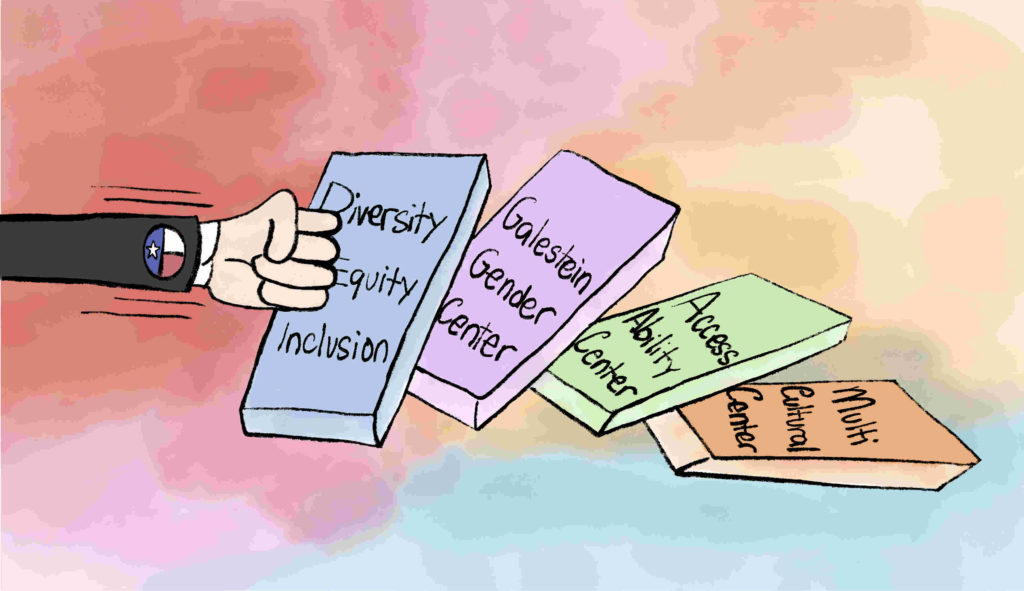Governor Gregg Abbott signed Senate Bill 17 into law on June 17, which requires all diversity, equity and inclusion offices in Texas public universities to be dismantled by Jan. 1, 2024.
SB 17 prohibits state-funded universities from maintaining DEI offices and programs, thus restricting how universities cultivate diversity, equitable access to education, and inclusion on their campuses. Senator Brandon Creighton, R-Conroe, said he proposed SB 17 to the legislature this March so colleges and universities could focus on education and innovation without DEI distraction. The bill was under close scrutiny from Democrats, who believe that the legislation prioritizes political agenda over student success and that DEI initiatives are meant to enhance academic quality for more students, not hinder them.
Brooke Everette, assistant vice president of student affairs DEI initiatives, said UTD is one of the most diverse campuses in Texas in terms of race, religion, sexuality, and other demographics, and thus will be heavily impacted by the law. The loss of ODEI will affect students who rely on the office for support and resources, and the campus population generally who benefit from equitable education and a culture of inclusion. Everette said she believes that the bill misdefines what DEI really means.
“It outlines some things regarding public institutions of higher education and what they can and cannot do as it relates to diversity, equity and inclusion,” Everette said. “The bill is very specific in terms of what they consider DEI work or DEI offices, and how [the lawmakers] define it is not necessarily how it is defined in higher education.”
UTD has multiple offices and departments that promote DEI initiatives and programming such as ODEI, Multicultural Center, Accessibility Resource Center and Galerstein Gender Center. There are also academic units within each school where staff members like assistant deans, vice presidents, etc. play a major role to advocate for DEI.
“It’s not one person or one individual department trying to ensure that the university is a safe, welcoming space … that’s the job of everyone which involves multiple people, departments and units.” Everette said. “So, in terms of how the bill impacts offices, it will impact multiple offices, individuals and jobs.”
The new bill may also impact admission applications around Texas as it bars requiring diversity statements. Although UTD does not require applicants to submit diversity statements, the number of students or faculty who respond to the diversity question could be affected.
“Typically, this institution has not required faculty candidates to submit a diversity statement with their application, some choose to do it,” Stephen Spiro, sssociate provost of auxiliary services said. “Some other institutions require it but we haven’t required it in the past and moving forward … SB-17 will not allow us to require it.”
UTD is unsure what the process and timeline for dismantling ODEI and DEI initiates will look like as well as what specific centers will be affected. A Board of Regents meeting is set to take place in August and November to brainstorm definitive plans.
“We are still trying to understand what the bill means and how to work within the bill, what we can do what we cannot do,” Everette said. “One thing we do know is that we at the University of Texas at Dallas and our administrators on campus are committed to still ensuring a safe campus, and a campus that is welcoming for all faculty, staff and students … we are not looking to change that any time soon … it’s just a matter of how we can continue to live that out within this new legislation.”
Depending on what offices shut down and what offices are not, DEI initiatives may have to go through student organizations to continue serving the community.
“That’s something we might see moving forwards with this legislation, that students are doing a lot more than what has occurred in the past,” Everette said. “We will certainly be here to help them every step of the way and provide them with whatever information, resources, support they need to do if it does have to come to that.”
Everette said the new legislation is also putting university jobs at stake.
“By the new legislation, my job can no longer exist as it is,” Everette said. “I hurt for our students. I got into higher education as a profession because I wanted to help students… and make sure that they had the resources and everything they needed to be successful… this legislation makes it harder to do that.”





